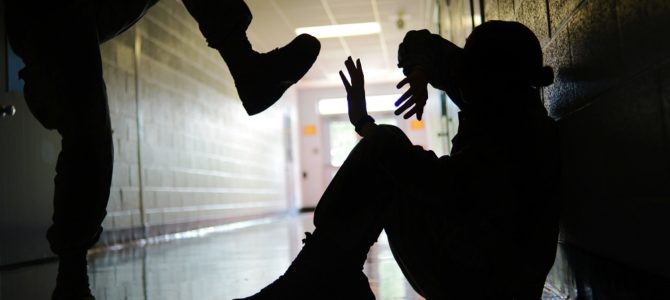
There comes a time when a nation must question the wisdom of continuing a losing war. It took the United States 18 years to abandon the war in Vietnam. It took 13 years to end the war against alcohol. After a substantially longer period, we’re winding down the war against marijuana.
Now it’s time to retreat on another fruitless war: The one on bullying. Not that bullying is fine. But the way we are fighting has all of us—parents, teachers, kids, psychologists—stuck in an increasingly costly and bloody quagmire.
The conventional wisdom about bullying is that society is not doing enough to stop it. If only we increase awareness of bullying and intensify our anti-bullying policies, bullying will finally disappear.
But bullying awareness is coming out of our ears. The true problem is that the orthodox approach to bullying is a Catch-22: the harder we implement it, the worse the bullying problem becomes. What’s needed is a fundamentally different paradigm, a truly effective approach would require less effort and get better results.
Such an approach exists. The world hasn’t yet embraced it because researchers take it for granted that the current approach is correct. They are reluctant to conduct studies on fundamentally different approaches, considering them dangerous.
Where We Got Today’s Ineffective Bullying Programs
The current approach is best characterized as a law-enforcement approach, treating all negative behavior as a crime that is not to be tolerated. It views social life as an amalgam of evil bullies who bear sole responsibility, innocent victims who bear no responsibility, and bystanders who actively or passively enable bullying.
By holding education institutions legally responsible for the bullying among students, it pressures them to morph into totalitarian police systems that monitor and record all children’s interactions, stripping them of freedom to say or do anything that can upset each other. It transforms educators, school psychologists, counselors, and social workers into security guards, detectives, judges, and disciplinarians.
This approach was created by Norwegian psychological researcher Prof. Dan Olweus in the 1970s in response to a series of suicides by bullied teens. The Olweus Bullying Prevention Program (OBPP) has become the most widely used in the world and is considered “the gold standard.”
All scientists subsequently taking interest in bullying found his work, spread his teachings as gospel, and based their own programs on his. Furthermore, they have successfully lobbied for laws that require schools to implement Olweus’ approach to bullying. Thus, the entire field of bullying is an inverted pyramid based on the ideas of one individual.
But It Doesn’t Work Very Well
The problem is that the law-enforcement paradigm doesn’t work very well. The most extensive study of the OBPP, conducted a few years ago in Pennsylvania, found a mere 12 percent reduction in the number of children who complain of being bullied twice or more per month in those schools that properly implemented it for two years. That’s a failure rate of 88 percent!
Every meta-analysis of research on anti-bullying programs and laws has found that they rarely produce more than a minor reduction in bullying and often result in an increase. Strangely, bullying researchers never recommend that we abandon these ineffective programs and policies, only that they be intensified.
The law-enforcement paradigm is failing because it abandons well-established principles of psychology and philosophy and replaces them with what cognitive behavior psychology recognizes as irrational beliefs. We must realize that the great majority of bullying is verbal and relational: insults, rumors, gestures, social exclusion, and nasty messages in cyberspace. Although these acts are negative, they are inevitable features of social life.
Even adults regularly engage in them. But anti-bullying education teaches kids that they are entitled to a life without bullying, that words can scar them forever, that they are too weak to handle bullying on their own, and that everyone—teachers, parents, police, their fellow students—must protect them. It also teaches that they must inform the school authorities when they experience or witness bullying, because the authorities can make the bullying stop.
These irrational beliefs promote vulnerability, helplessness, and a victim mindset. Having been indoctrinated with the belief that words are even more destructive than sticks and stones, they get more readily upset by insults, which encourages further bullying, trapping them in an endless cycle.
Even worse, when they involve the school authorities, hostilities immediately escalate as each side passionately argues that they are innocent and the other is guilty. Informers typically earn the reputation of tattletale or snitch, a social death sentence. When bullying escalates to serious physical violence, it is almost always after the school has gotten involved enforcing anti-bullying policies.
We Don’t Have to Do It This Way
There is a superior way of dealing with bullying. It is a psycho-educational paradigm. It’s based on the understanding that humans are not divine angels, nor are they computers that can be programmed to only do good. We are animals possessing a basic nature that is not always nice and cannot be eliminated by legal decree, and to solve problems we need to work in accordance with the laws of nature, not by ignoring them.
Psychology recognizes that people are most dangerous not when we feel like bullies but when we feel like victims. It confirms the ancient wisdom that humans are hypocrites, adept at seeing the speck in others’ eyes while failing to see the plank in our own. That’s why the anti-bully movement is so popular—everyone thinks the bully is the other person.
The psycho-educational approach involves teaching children the dynamics of interpersonal relations and how to defuse hostility on their own. It is remarkably easy to stop being picked on when one knows how. It is far easier than learning the 3 R’s, which takes months or years of instruction. A properly trained counselor, a few short classrooms lessons, and a rational school discipline policy are all it takes to dramatically reduce bullying.
In a nutshell, the reason kids become victims of bullying—meaning, relentlessly picked on by one or more other children—is that they get upset when they’re picked on. Every victim of bullying gets upset, and no one who doesn’t get upset gets picked on relentlessly.
The task, then, is to teach kids how to handle hostility without getting upset. There are really just three basic principles kids need to learn to stop being victimized: 1. The way to defeat bullying is by staying calm. 2. When we get upset, we are really upsetting ourselves. 3. It is much easier not to get upset once we realize it’s in our control.
Turn Negativity Into Positivity
More comprehensive instruction conveys that the Golden Rule is a powerful tool for our OWN good, to actively defeat our bullies and turn negativity into positivity. This isn’t Pollyanna. It is psychology at work.
For example, say a child is called “idiot.” The response could be, “Well, I happen to think you’re smart.” Called “fatso,” they can respond, “It’s so great you’re thin.” When faced with a nasty rumor, rather than defending oneself, a more effective response is, “Do you believe it?” If the rumormonger says, “Yes,” the winning response is, “You can believe it if you wish.” If they say, “No,” the response is, “Good.”
Either way, the target wins. Physical aggression is potentially more dangerous and may require adult intervention, although kids can often defuse it on their own depending upon the situation.
Life is replete with social challenges, including bullying. Children deserve to be taught how to handle them. When they no longer require everyone else to protect them and to solve their social problems for them, they grow in self-confidence, resilience—and popularity.
The war against bullying is an oxymoron. If we wish to truly make children safe from bullying, we need to teach them how not to be victims. That is a war they can win.









